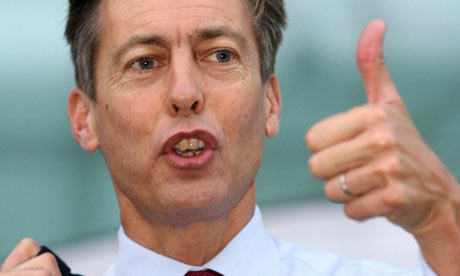As Martin Bell showed, Independent MPs can bring many positive qualities to the task of representing their constituencies - and to improving the damaged reputation of their kind.
We need many more Independent MPs to break the 'Labour-Tory-Labour-Tory' strangle-hold over Parliament. Unless that strangle-hold is broken there will never be a Parliament of which to be proud.
But did you know that there is an Independent Network of those interested in helping us get more Independent `MPs? They have issued an inspiring statement.
Below is the statement entitled 'New Principles for Politicians'. First you might want to give an 'impression score' out of 10 for your own MP. This is in relation to Lord Nolan's 7 principles that the document incorporates;
My impression of my MP is that s/he - on a score of 1 (low degree of) to 10 (high degree of) - has shown
selflessness,
integrity,
objectivity,
accountability,
openness,
honesty
However you will see that Martin Bell and the Independent Network have transformed those 7 qualities into more operational and formative principles that would undoubtedly transform Parliament and give us a modern Parliament and political system - that is one to be proud of;
New Principles for Politicians
The Bell Principles: New guidelines for independent candidates
Independent Network recruiting candidates for
General and London Local Elections
Martin Bell has endorsed a new code of conduct for independent candidates in a move to bring honesty back into politics. The Bell Principles are thought to be the first set of conduct guidelines created by a political organisation for its affiliated candidates and representatives. The principles will be used by the Independent Network ─ a loose association that provides support to political candidates that are not members of traditional political parties or organised factions ─ to endorse and influence the conduct of its affiliates.
The Bell Principles require that all independent candidates:
-
abide wholeheartedly by the spirit and letter of the Seven Principles of Public Life set out by Lord Nolan in 1995: selflessness, integrity, objectivity, accountability, openness, honesty and leadership
-
be guided by considered evidence, their real world experience and expertise, their constituencies and their consciences
-
be free from the control of any political party, pressure group or whip
-
be non-discriminatory, ethical and committed to pluralism
-
make decisions transparently and openly at every stage and level of the political process, enabling people to see how decisions are made and the evidence on which they are based
-
listen, consulting their communities constantly and innovatively
-
treat political opponents with courtesy and respect, challenging them when they believe they are wrong, and agreeing with them when they believe they are right
-
resist abuses of power and patronage and promote democracy at every level
-
work with other elected independents as a group with a chosen spokesperson
-
claim expenses, salaries and compensation openly so the public can judge the value for money of their activities.
A spokesperson for the Independent Network said, “Voters have become increasingly dissatisfied with party politics. Just one per cent of voters are members of a political party and 73 per cent of voters believe that they do not have a say in the way the country is run. The Bell Principles will help to provide a necessary bridge between the public and their politicians as the independent candidates signed up to them will listen to and consult their communities constantly.”
Independent Network Recruiting Candidates



















